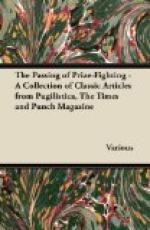As a nation of sportsmen, it rouses our
ire
To hear of sport ruined by
such a proceeding;
And to snigglers we earnestly wish and
desire
To give the advice they so
sadly seem needing.
Let them think, as they work their inglorious
plan,
How old IZAAK must turn in
his grave and must wriggle;
And may they in future all see if they
can,
By learning to angle, forget
how to sniggle!
* * * * *
IN OUR GARDEN.
[Illustration]
Discovered on returning home that the Member for SARK had not at all exaggerated the facts picturing disaster to our onion-bed. This portion of the garden had been disappointing from the first. Early in the Spring, when hope beat high, and the young gardener’s fancy lightly turned to thoughts of large crops, SARK and I were resting after a frugal luncheon, when ARPACHSHAD suddenly appeared at the open window. I knew from his beaming face that something was wrong.
Perhaps I should explain that ARPACHSHAD is our head gardener. We have no other, therefore he is the head. Out of the garden he is known as PETER WALLOPS. It was SARK who insisted upon calling him ARPACHSHAD. SARK had noticed that about the time of the Flood there was singular deliberation in entering upon the marriage state. Matrimony did not seem to be thought of till a man had turned the corner of a century. SHEM, himself, for example, was fully a hundred before his third son, ARPACHSHAD, was born. But ARPACHSHAD was already a husband and a father at thirty-five.
“That,” said SARK, “is a remarkable circumstance that has escaped the notice of the commentators. It indicates unusual forwardness of character and a habit of swift decision. We hear nothing more of ARPACHSHAD, but we may be sure he made things move. Now what we want in this garden is a brisk man, a fellow always up to date, if not ahead of it. Let us encourage WALLOPS by calling him ARPACHSHAD.”
WALLOPS on being consulted said, he thought it ought to be a matter of another two shillings a-week in his wages; to which I demurred, and it was finally compromised on the basis of a rise of a shilling a-week. As far as I have observed, SARK’S device, like many others he has put forward, has nothing in it. WALLOPS couldn’t be slower in going round than is ARPACHSHAD. The only time he ever displays any animation is when he discovers some fresh disaster. When things are going well (which isn’t often) he is gloomy and apprehensive of an early change for the worse. When the worst comes he positively beams over it. Difficult to say whether he enjoys himself more in an over-wet season, or in one of drought. His special and ever-recurring joy is the discovery of some insect breaking out in a fresh place. He is always on the look-out for the Mottled Amber Moth, or the Frit-fly, or the Currant Scale, or the Apple-bark Beetle, or the Mustard Beetle,—“Black Jack,” as he familiarly calls him. To see, as is not unfrequent, a promising apple-tree, cherry-tree, or damson-tree, fading under the attack of the caterpillars of the Winter Moth, makes ARPACHSHAD a new man. His back unbends, his wrinkles smooth out, the gleam of faded youth reillumines his countenance, and his eyes melt in softer glance.




